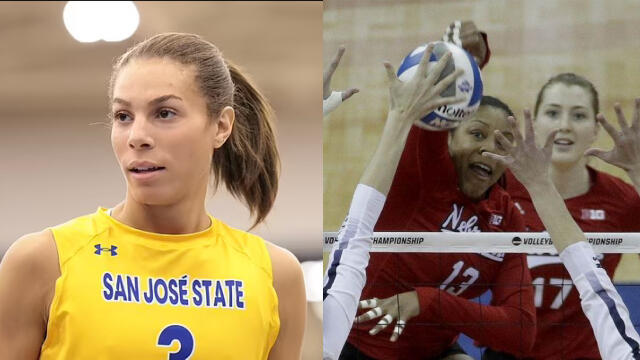Blair Fleming, a transgender college volleyball player at San Jose State University, has become the center of a national controversy, sparking outrage from women’s rights advocates and athletes alike. Fleming, a biological male competing in women’s volleyball, has played a significant role in leading the San Jose State women’s team to the Mountain West Volleyball Championship finals, showcasing his physical dominance through powerful spikes and an imposing 6-foot-1 stature—far above the average height for female players.
The controversy deepened during the regular season when multiple teams, including Boise State, forfeited games in protest of Fleming’s participation, granting San Jose State seven conference wins by default. Despite the team’s apparent 12-5 record, six of those victories came without competition.
The backlash reached a boiling point on Saturday when three Colorado State players knelt during the national anthem. While their coach, Emily Kohan, claimed the gesture was tied to the Black Lives Matter movement, critics speculate the protest was fueled by the presence of a transgender athlete on the court. The issue escalated further when allegations surfaced that one of the kneeling players, Malaya Jones, conspired with Fleming to injure her teammate, Brooke Slusser.
After footage of Trans Identifying Male volleyball Brayden “Blair” Fleming surfaced in Sept 2024, the domino effect of teams refusing to play against the San Jose State Spartans started:
•On Sept 14th, Southern Utah forfeited the game due to the Trans athlete Brayden “Blaire”… pic.twitter.com/m5IjRr91Sq
— Heatherheather007 (@LibertyValkyrie) November 29, 2024
Slusser is now suing San Jose State and the NCAA, alleging she was forced to share living and changing spaces with Fleming without being informed he is a biological male. This lawsuit follows a contentious ruling earlier in the week by Judge Shane Kato Crews, a Biden appointee, who upheld Mountain West’s transgender participation policy, stating that the plaintiffs failed to act in a timely manner despite the policy being in effect since 2022.
Fleming’s athletic dominance isn’t new; as a teenager, competing as “Brayden Fleming,” he set numerous records in high school, with videos showcasing his unmatched spikes against female opponents. This history of success, combined with his current performance, has left many questioning the fairness of allowing biological males to compete in women’s sports.
Adding to the controversy is the precedent set by the 2020 Supreme Court decision that expanded the Civil Rights Act to include gender identity protections, a ruling conservatives argue has led to unintended consequences like this case.
As the debate continues, this situation highlights a growing divide over fairness and inclusivity in sports, leaving athletes, coaches, and fans grappling with the implications of policies that redefine traditional boundaries.







